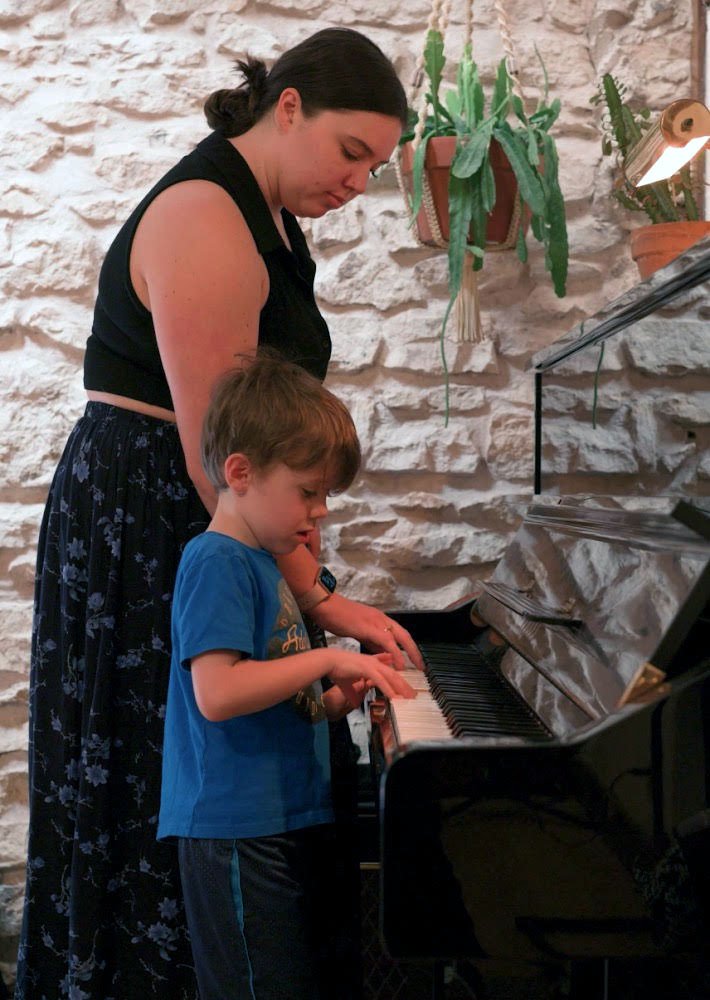The case for expectation-free, exploratory music learning
/Grace Thompson is a voice and piano teacher based in Austin. She is a classically trained soprano who graduated from Kennesaw State University in 2021 with a bachelor’s degree in music–ethnomusicology. A longtime advocate for the neurodiverse community, Grace joins us on the blog to discuss her nontraditional methods of teaching music to kids through the Groove Garden program at Eastside Music School.
Musicking: (v.) any activity that includes playing, performing, listening, writing,
recording, or sharing music.
Childhood music lessons. We’ve all been there before, or maybe you haven’t. A parent has signed you up for a music lesson—piano, guitar, violin, or maybe even singing—and you’re getting ready to demonstrate to your teacher what you were meant to have practiced in the time since your last lesson.
Only you haven’t practiced or didn’t get as much practice time as you wanted. Teachers always can tell when a student hasn’t practiced, and you know walking in that your teacher will pick up on your lack of practice. Does this make me a bad student? A bad musician? Will my teacher be mad at me? Or disappointed? Will I ever learn to play this instrument?
As you go to play your instrument, these fears and anxieties course through your still-developing brain and begin to distract you and tell you that you’re not good enough. Playing your instrument has now turned from a fun hobby after school to an insurmountable test. The traditional private music lesson environment can, unfortunately, breed these sentiments in students, eventually turning students off from music as a whole.
Now imagine yourself as an atypical learner. Traditional learning environments are already not geared toward you, and now there is compounded stress from not being able to meet the expectations set by your teacher. These expectations have been set from a hegemonic system of learning music that is centuries old. This system of learning does not reflect the modern learner and is, in part, creating more failures than successes.
As a music teacher, I define success as a student being happily engaged in their studies, followed by an improvement in their technical and theoretical abilities. To support this type of musical education, the environment must be conducive to every learner, and we can create these environments by leading exploratory-driven, expectation-free music classrooms.
Musicking is a life-long process that no one will ever truly master. It is the embodiment of “about the journey, not the destination,” so we should present to students this idea of a musical journey. Twists, turns, and unforeseen circumstances may occur on our journey through a musical life, and allowing students to explore for themselves will well-equip them to navigate these changes. Perhaps a violin student watches a harpist and becomes enamored with this new instrument, or a classical piano student wants to begin playing jazz repertoire. These changes in instrument or repertoire are not typically supported in a traditional music education environment due to the expectations to stay with and master one particular instrument or genre.
Taking out the expectations of a traditional music classroom environment gives students fewer restrictions to explore different areas of music they might not have been exposed to before, and more confidence to try without the fear of failure or rejection. Expectation-free learning passes the baton into the hand of the students to create and express themselves without any limitations. Autonomy is given back to the child, therefore creating a more enthusiastic student. Exploration-led classrooms also promote social growth through a free exchange of ideas between peers, unclouded by any pre-existing musical “rules.”
Music education is vital to all people, but especially children, as it has been linked with a plethora of brain-boosting qualities such as supporting language and reasoning skills, emotional intelligence, coordination and fine motor skills, memorization and imagination, and intellectual curiosity, among many others (see nafme.org). Learners who find themselves on the Autism spectrum or any other spectrum of learning differences can especially reap the benefits from any of these characteristics.
Music plays a part in many other fields of academia, and finding an interest in music can help support other areas of interest for students as well, such as math, science, visual arts, and history. Music also supports a social outlet for students who lack interaction with peers, whether because of developmental differences or more solitary forms of education such as homeschooling or virtual learning.
Eastside Music School’s Groove Garden is an inclusive music class for children of all ages, backgrounds, and learning styles. It’s designed for kids to learn and make music together in a way not normally offered in traditional music classes or private lessons. Parents are also welcome to join their students as parents play a fundamental role in the student/teacher relationship. We encourage exploration-based learning as well as expectation-free instruction. In this class, we aim to give students the basics of music education, such as rhythm, melody, harmony, and instrument types, while also allowing for independent and group playing as well as encouraging student leadership and autonomy. While children in traditional music education are often given very little voice, if any, in what they choose to study, at the Groove Garden, we allow students to have a say in what kinds of music to study and activities they enjoy.
The next Groove Garden class will be held on Thursday April 27, from 3pm to 4pm at Eastside Music School.
Grace Thompson | Groove Garden

















